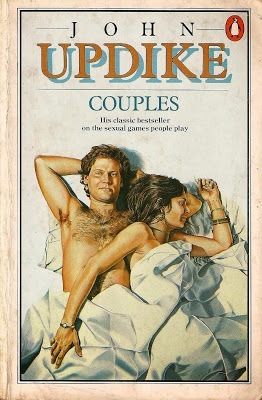Christine Smallwood in Bookforum:
 By the time Couples came out, John Updike had already published four novels, three story collections, two poetry collections, and a volume of assorted prose. He had been called, by the New York Times Book Review, “the most significant young novelist in America,” and had been sent by the State Department on a tour of the Communist bloc. And yet there was a growing sense that he had not made a major statement on the issues of the day. He could describe a barn well enough, but to what end? The man whose name will be forever asterisked with the insult David Foster Wallace made famous—“just a penis with a thesaurus”—was thought to be clever but a little small, too decorative, and overly fond of childhood reminiscence. Norman Podhoretz complained that Updike “has very little to say.” John Aldridge put him in “the second or just possibly the third rank of serious American novelists.” Elizabeth Hardwick admired Rabbit, Run, but thought there was “something insignificant, or understated, or too dimly felt in the heart of Rabbit himself.” As for his sexual frankness, Updike, like his contemporaries, had “not decided or discovered in what way this frankness will change the work itself. It cannot be merely interlarded like suet in the roast.”
By the time Couples came out, John Updike had already published four novels, three story collections, two poetry collections, and a volume of assorted prose. He had been called, by the New York Times Book Review, “the most significant young novelist in America,” and had been sent by the State Department on a tour of the Communist bloc. And yet there was a growing sense that he had not made a major statement on the issues of the day. He could describe a barn well enough, but to what end? The man whose name will be forever asterisked with the insult David Foster Wallace made famous—“just a penis with a thesaurus”—was thought to be clever but a little small, too decorative, and overly fond of childhood reminiscence. Norman Podhoretz complained that Updike “has very little to say.” John Aldridge put him in “the second or just possibly the third rank of serious American novelists.” Elizabeth Hardwick admired Rabbit, Run, but thought there was “something insignificant, or understated, or too dimly felt in the heart of Rabbit himself.” As for his sexual frankness, Updike, like his contemporaries, had “not decided or discovered in what way this frankness will change the work itself. It cannot be merely interlarded like suet in the roast.”
With Couples, Updike served up a whole plate of suet. (Do you understand the genius of Hardwick’s metaphor? Suet is the hard white fat on the loins of beef or mutton.) He worked out the plot in church, jotting down notes on the weekly program—maybe that’s why the book has the air of being so scandalized by itself.
More here.
